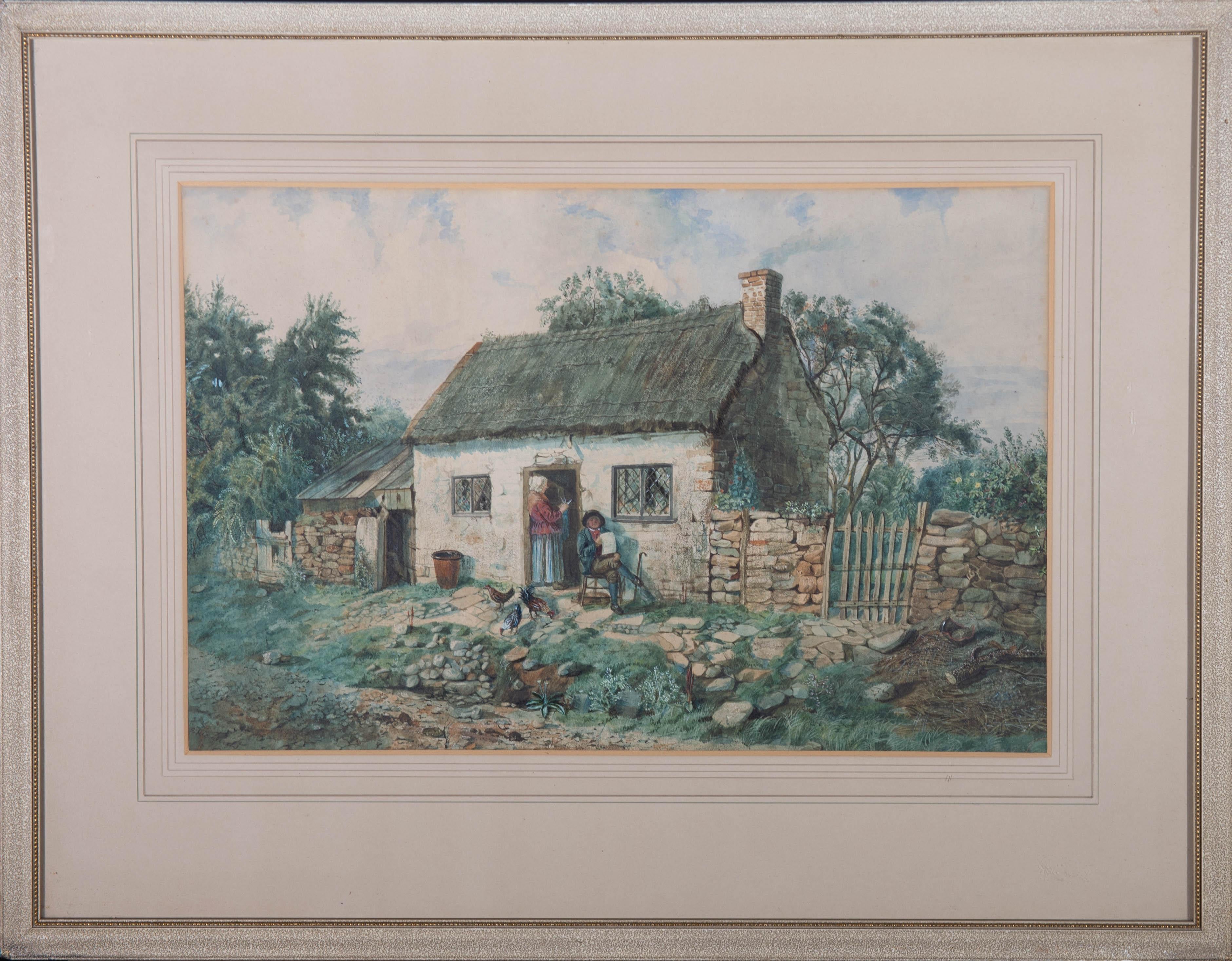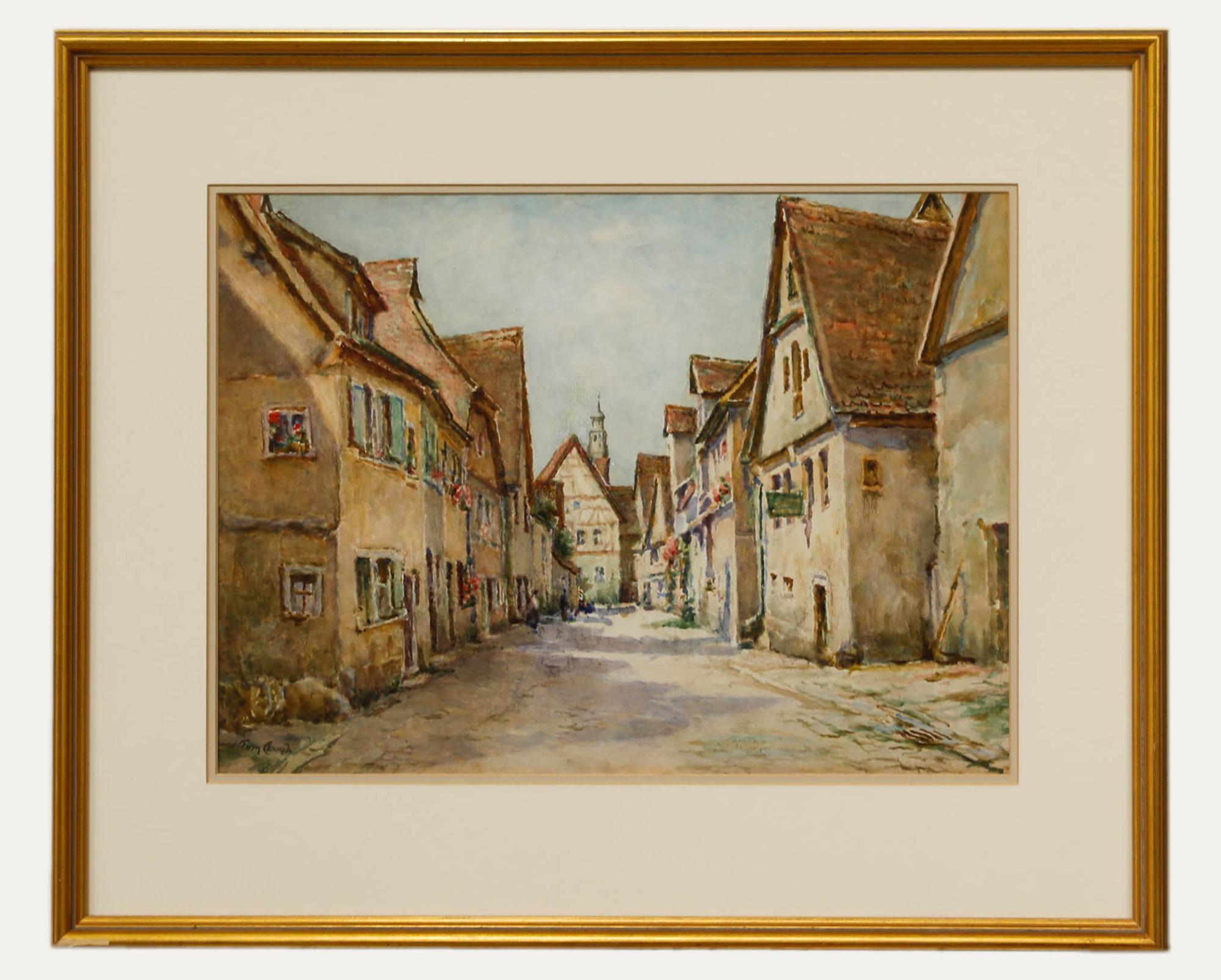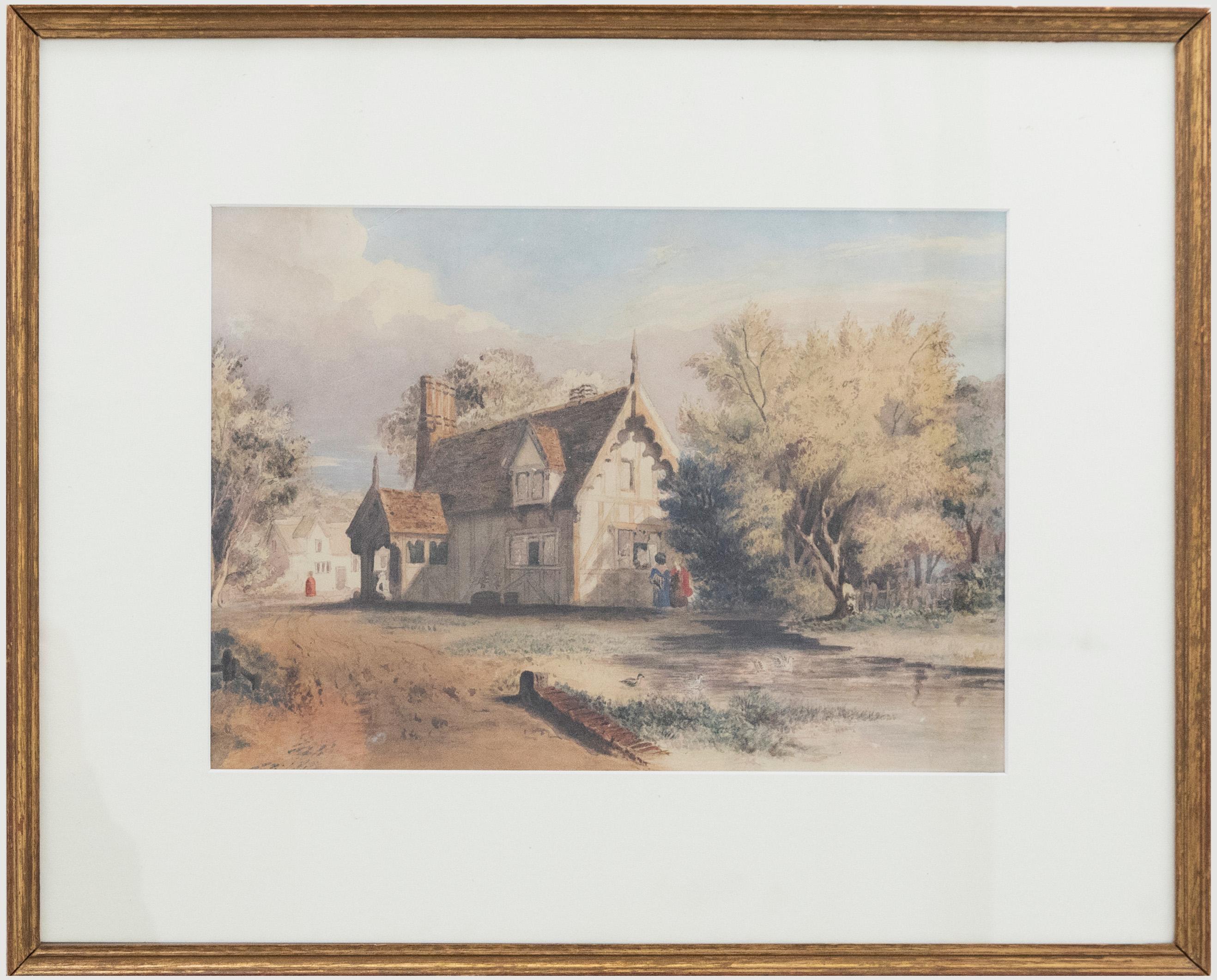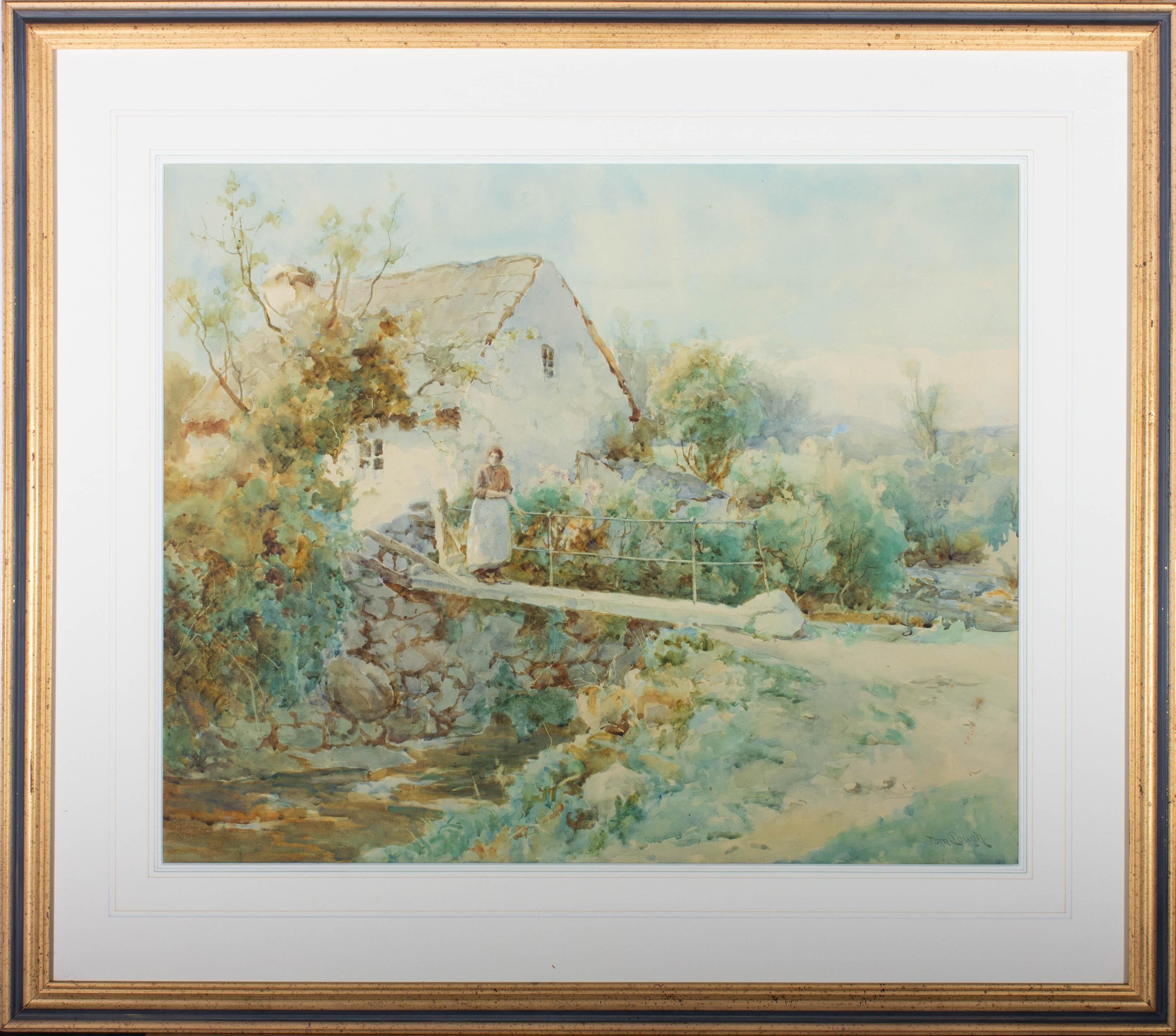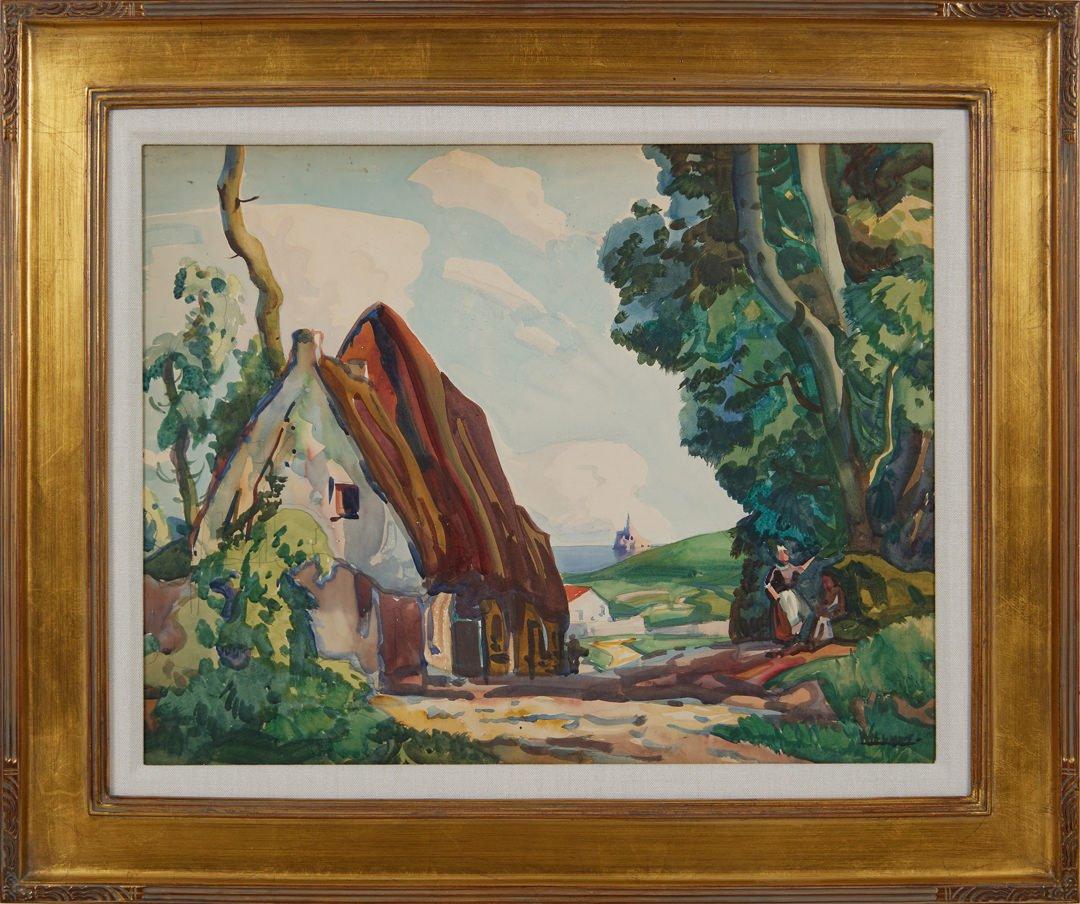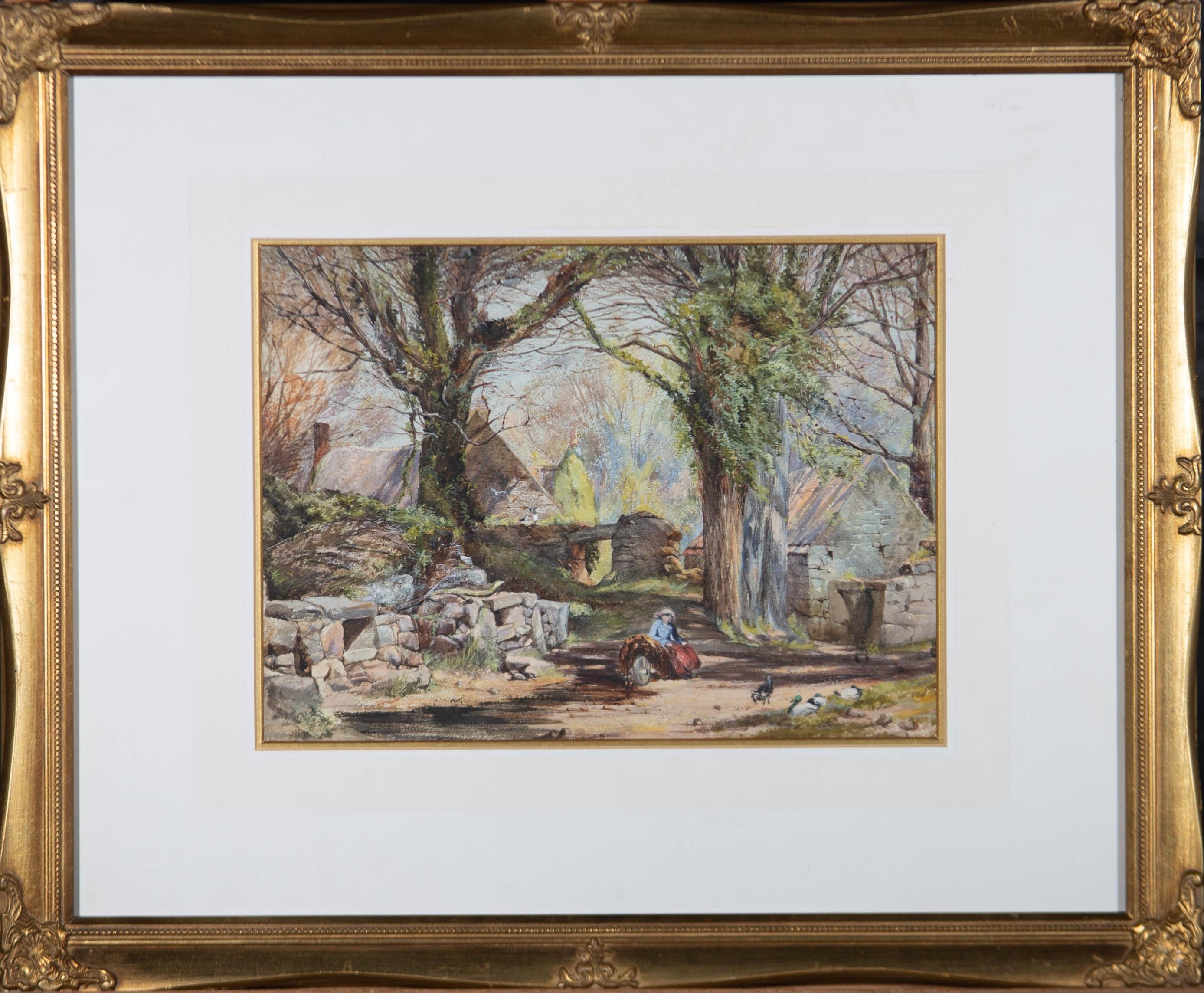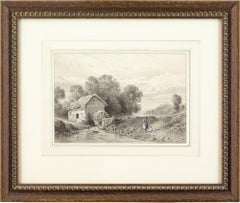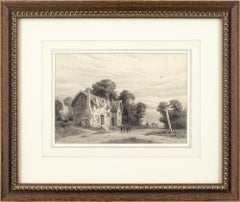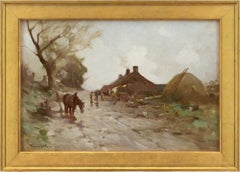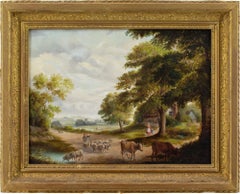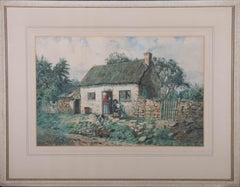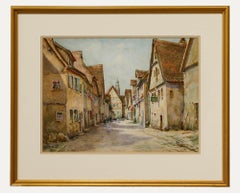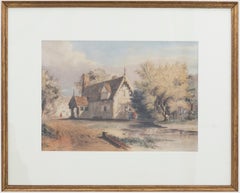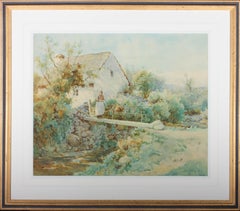Items Similar to William Kay Blacklock ARCA, Continental Farmhouse In Summer
Want more images or videos?
Request additional images or videos from the seller
1 of 13
William Kay Blacklock ARCA, Continental Farmhouse In Summerc. 1922
c. 1922
$685.21
£500
€583.33
CA$938.57
A$1,043.89
CHF 545.09
MX$12,703.05
NOK 6,961.60
SEK 6,528.75
DKK 4,353.62
Shipping
Retrieving quote...The 1stDibs Promise:
Authenticity Guarantee,
Money-Back Guarantee,
24-Hour Cancellation
About the Item
This charming early 20th-century watercolour by eminent British artist William Kay Blacklock ARCA (1872-1924) depicts an elderly lady carrying a basket and parasol before a farmhouse.
Born in Bishopwearmouth, Sunderland, Blacklock’s early years appear to be rather turbulent. His father, John Blacklock, an engine fitter, lost his life early, leaving his mother to raise the family alone. In 1891, the census records him living in Carlisle where his mother worked as a publican. One can’t imagine the stresses placed upon a Victorian family in this situation.
To help with the finances, the budding artist gained an apprenticeship working for a lithographer and before long enrolled at the Royal College of Art in London. At just 25, he debuted at the Royal Academy with ‘The Home of the Fisherman, Whitby’.
A keen draughtsman, he excelled at figure work with a particular skill for light effects and drapery. In a piece titled ‘Playing with Mother’, a red-cheeked toddler sits by grasses on a beach, while her doting mum prods a yellow spade in the sand. The outfits and expressions are handled beautifully. The mother wears a straw hat with a ribbon, shading her face from the radiant sun. While the view beyond extends towards a dark blue suggestion of the distant sea.
Blacklock specialised in scenes such as this - sentimental, somewhat idealised, yet carrying all the charm you could ever wish for. Women were generally front and centre - usually portrayed in caring/providing roles. Many of these feature ‘Nellie’, his regular model, whom he married in 1909.
Following his marriage, the pair moved several times - Chelsea, Suffolk, Cambridgeshire, Leicester, France and Polperro. This inability to settle was caused in part by Blacklock’s failing health and the necessity to find warmer climbs but also, in 1921, by a serious house fire.
This piece, from around 1922, was probably produced during the pair’s extended stay in France. Here, we see an elderly lady carrying a basket and parasol, returning to a quaint old farmhouse with window shutters. Radiant sunshine illuminates the stonework.
With his health continuing to worsen, the Blacklocks moved to Polperro in Cornwall, where he died in 1924. He left behind a remarkably joyous oeuvre despite the realities of his challenging situation. A true artist.
His works were shown at the Royal Academy, Royal Institute of Oil Painters, Royal Scottish Academy, Royal Institute of Painters in Water Colours, Royal Institute of Oil Painters, and Laing Art Gallery in Newcastle. He’s represented at the Walker Art Gallery in Liverpool.
Signed in the lower right and held within a contemporary frame. Glazed.
Provenance: Private collection, UK.
Artist’s auction maximum: £85,000 for ‘Sunlight and Shadow’, Oil on canvas, Christie’s, Victorian Pictures, Drawings And Watercolours, London, 1996 (lot 631).
- Attributed to:William Kay Blacklock (1872 - 1924, British)
- Creation Year:c. 1922
- Dimensions:Height: 21 in (53.34 cm)Width: 17.5 in (44.45 cm)
- Medium:
- Movement & Style:
- Period:
- Condition:Assessed and approved by our conservator. Overall, it presents well.
- Gallery Location:Cheltenham, GB
- Reference Number:1stDibs: LU2328214566612
About the Seller
5.0
Platinum Seller
Premium sellers with a 4.7+ rating and 24-hour response times
Established in 2017
1stDibs seller since 2023
240 sales on 1stDibs
Typical response time: 1 hour
- ShippingRetrieving quote...Shipping from: Cheltenham, United Kingdom
- Return Policy
Authenticity Guarantee
In the unlikely event there’s an issue with an item’s authenticity, contact us within 1 year for a full refund. DetailsMoney-Back Guarantee
If your item is not as described, is damaged in transit, or does not arrive, contact us within 7 days for a full refund. Details24-Hour Cancellation
You have a 24-hour grace period in which to reconsider your purchase, with no questions asked.Vetted Professional Sellers
Our world-class sellers must adhere to strict standards for service and quality, maintaining the integrity of our listings.Price-Match Guarantee
If you find that a seller listed the same item for a lower price elsewhere, we’ll match it.Trusted Global Delivery
Our best-in-class carrier network provides specialized shipping options worldwide, including custom delivery.More From This Seller
View AllEdmond Albert Joseph Tyrel de Poix, Landscape With Watermill, Mother & Child
Located in Cheltenham, GB
This charming 19th-century drawing by British artist Edmond Albert Joseph Tyrel de Poix (1840-1916) depicts a mother and child standing by a mill pond before a rustic watermill.
De Poix was a gentleman artist descended from French nobility...
Category
1870s English School Landscape Drawings and Watercolors
Materials
Pencil, Paper
Edmond Albert Joseph Tyrel de Poix, Landscape With Pub & Signpost
Located in Cheltenham, GB
This charming 19th-century drawing by British artist Edmond Albert Joseph Tyrel de Poix (1840-1916) depicts a timber-framed public house, figures, horses and a leaning signpost.
De ...
Category
1870s English School Landscape Drawings and Watercolors
Materials
Pencil, Paper
Robert Russell MacNee, Landscape With Farm, Track & Horses
By Robert Russell Macnee
Located in Cheltenham, GB
This evocative early 20th-century oil painting by Scottish artist Robert Russell MacNee RGI (1880-1952) depicts a farm with a track, horses, and figures. MacNee was an accomplished p...
Category
1910s Landscape Paintings
Materials
Oil, Board
Mid-19th-Century English School, Rural Scene With Family, Cattle & Cottage
Located in Cheltenham, GB
This endlessly charming mid-19th-century English oil painting depicts a rural scene with a family, cattle, pond, and cottage.
A mother and child pause to observe a drover, perhaps f...
Category
1830s Landscape Paintings
Materials
Canvas, Oil
Edward Charles Williams (Attributed), Wooded River Landscape With Boathouse
By Edward Charles Williams
Located in Cheltenham, GB
This mid-19th-century oil painting, attributed to English artist Edward Charles Williams (1807-1881), depicts a wooded river landscape with a boathouse, cottage, fishermen and figure...
Category
1850s Victorian Landscape Paintings
Materials
Panel, Oil
Edward William Cooke RA, West-Country Cove With Cottages, Family & Donkeys
By Edward William Cooke
Located in Cheltenham, GB
This idyllic late 19th-century oil painting by English artist Edward William Cooke RA (1811-1880) depicts a west-country cove with two cottages, donkeys, figures, and fishing boats. Cooke was a highly renowned painter of marine scenes and landscapes who exhibited extensively at London’s Royal Academy.
From our elevated vantage point, the view extends between two quaint cottages and across the beach before sweeping around the sandy coastline. Crystalline waters lap the shore, where moored craft rest. It’s an accomplished rendering of a challenging composition. It’s enhanced by trees, which essentially ‘frame’ the right side, while a wooded track provides interest on the left.
Cooke was a keen admirer of the Dutch old masters, and the spirit of the Golden Age underpins this splendid work. In diaries, he recorded how he travelled by donkey to access elevated spots in the southwest, so it’s conceivable that he did so here. In his catalogue raisonné, it lists a work from the same year titled ‘Bay with Donkeys’.
Born in Pentonville, London, Cooke was raised in the company of accomplished artists as both his father, George Cooke (1781-1834), and his uncle, William Bernard Cooke (1778-1855), were engravers. As such, they were associated with a circle of Victorian painters who aided Cooke’s early development. These included the highly regarded marine painter Clarkson Frederick Stanfield RA RBA (1793-1867), who provided frequent advice and inspiration. Indeed, as a teenager, Cooke produced numerous drawings after Stanfield’s works.
A precocious talent, by the age of nine, he was already displaying an advanced understanding of engraving, particularly for ships, coupled with a natural, seemingly in-built skill as a draughtsman. Many of his early drawings depict pastoral landscapes after the masters, such as Nicolaes Berchem (1620-1683), Paulus Potter (1625-1654), and Karel Dujardin (1626-1678).
In an extraordinary turn of events, in 1820, his advanced abilities led to his first commission when he provided botanical illustrations for John Loudon's 'Encyclopaedia of Plants’. These were followed by drawings published in the 'Botanical Cabinet...
Category
1870s Victorian Landscape Paintings
Materials
Canvas, Oil
You May Also Like
R. Richards - Mid 19th Century Watercolour, Cottage Life
Located in Corsham, GB
A very fine and detailed watercolour painting with gouache details, depicting a rural landscape scene with a cottage, two figures and chickens nearby. Signed to the lower left-hand c...
Category
19th Century Landscape Drawings and Watercolors
Materials
Watercolor
$476 Sale Price
20% Off
Tom Clough (1867-1943) - Early 20th Century Watercolour, The Village in June
Located in Corsham, GB
An accomplished watercolour painting by the British artist Tom Clough. The scene depicts a charming village street with half-timbered houses and figures in the distance. Signed. Pres...
Category
20th Century Landscape Drawings and Watercolors
Materials
Watercolor
Late 19th Century Watercolour - Stopping by the Cottage
Located in Corsham, GB
A delightful depiction of a half timbered cottage in a rural village A woman leans out of the window to talk with two women passing by. the rest of the scene captures charming detail...
Category
Late 19th Century Landscape Drawings and Watercolors
Materials
Watercolor
$260 Sale Price
20% Off
Tom Clough (1867-1943) - Watercolour, Cottage Scene with Figure
Located in Corsham, GB
An accomplished watercolour painting by the British artist Tom Clough. The scene depicts an atmospheric view of a cottage and figure on a wooden bridge. Signed to the lower right-han...
Category
20th Century Landscape Drawings and Watercolors
Materials
Watercolor
$745 Sale Price
20% Off
Home in the Village, Mt. St. Michel, France, Early 20th Century Cleveland School
By Frank Wilcox
Located in Beachwood, OH
Frank Nelson Wilcox (American, 1887–1964)
Home in the Village, Mt. St. Michel, France, c. 1926
Watercolor on board
Signed lower right
21.75 x 28 inches
30.5 x 36.5 inches, framed
Frank Nelson Wilcox (October 3, 1887 – April 17, 1964) was a modernist American artist and a master of watercolor. Wilcox is described as the "Dean of Cleveland School painters," though some sources give this appellation to Henry Keller or Frederick Gottwald. Wilcox was born on October 3, 1887 to Frank Nelson Wilcox, Sr. and Jessie Fremont Snow Wilcox at 61 Linwood Street in Cleveland, Ohio. His father, a prominent lawyer, died at home in 1904 shortly before Wilcox' 17th birthday. His brother, lawyer and publisher Owen N. Wilcox, was president of the Gates Legal Publishing Company or The Gates Press. His sister Ruth Wilcox was a respected librarian.
In 1906 Wilcox enrolled from the Cleveland School of Art under the tutelage of Henry Keller, Louis Rorimer, and Frederick Gottwald. He also attended Keller's Berlin Heights summer school from 1909. After graduating in 1910, Wilcox traveled and studied in Europe, sometimes dropping by Académie Colarossi in the evening to sketch the model or the other students at their easels, where he was influenced by French impressionism. Wilcox was influenced by Keller's innovative watercolor techniques, and from 1910 to 1916 they experimented together with impressionism and post-impressionism. Wilcox soon developed his own signature style in the American Scene or Regionalist tradition of the early 20th century. He joined the Cleveland School of Art faculty in 1913. Among his students were Lawrence Edwin Blazey, Carl Gaertner, Paul Travis, and Charles E. Burchfield. Around this time Wilcox became associated with Cowan Pottery.
In 1916 Wilcox married fellow artist Florence Bard, and they spent most of their honeymoon painting in Berlin Heights with Keller. They had one daughter, Mary. In 1918 he joined the Cleveland Society of Artists, a conservative counter to the Bohemian Kokoon Arts Club, and would later serve as its president. He also began teaching night school at the John Huntington Polytechnic Institute at this time, and taught briefly at Baldwin-Wallace College.
Wilcox wrote and illustrated Ohio Indian Trails in 1933, which was favorably reviewed by the New York Times in 1934. This book was edited and reprinted in 1970 by William A. McGill. McGill also edited and reprinted Wilcox' Canals of the Old Northwest in 1969. Wilcox also wrote, illustrated, and published Weather Wisdom in 1949, a limited edition (50 copies) of twenty-four serigraphs (silk screen prints) accompanied by commentary "based upon familiar weather observations commonly made by people living in the country."
Wilcox displayed over 250 works at Cleveland's annual May Show. He received numerous awards, including the Penton Medal for The Omnibus, Paris (1920), Fish Tug on Lake Erie (1921), Blacksmith Shop (1922), and The Gravel Pit (1922). Other paintings include The Trailing Fog (1929), Under the Big Top (1930), and Ohio Landscape...
Category
1920s American Modern Figurative Drawings and Watercolors
Materials
Watercolor
20th Century Watercolour - Rural Idyll
Located in Corsham, GB
A watercolor and gouache scene depicting a woman sat on a path amongst trees and old farm buildings. Presented glazed in a white mount with a gilt-effect inner and a gilt-effect dist...
Category
21st Century and Contemporary Landscape Drawings and Watercolors
Materials
Watercolor
$328 Sale Price
20% Off
More Ways To Browse
Dior 1996
Painter Walker
Antique Spade
Continental School Painting
Victorian House Drawing
Used Window Shutters
Antique Chelsea
Dior Ribbon
Chelsea House Framed
Antique Continental Oil Painting
Antique Parasol
Fire Engine
Antique Shutters
Oil Painting Lady With Hat
Lady Dior Charms
Antique Victorian Fire Baskets
Sunderland Frame
Oil Painting Old Fisherman
